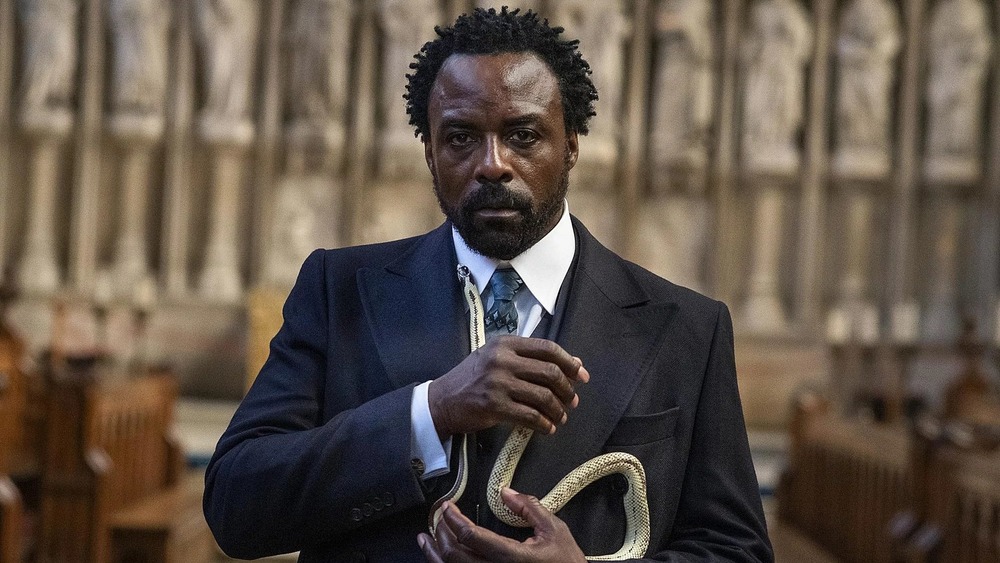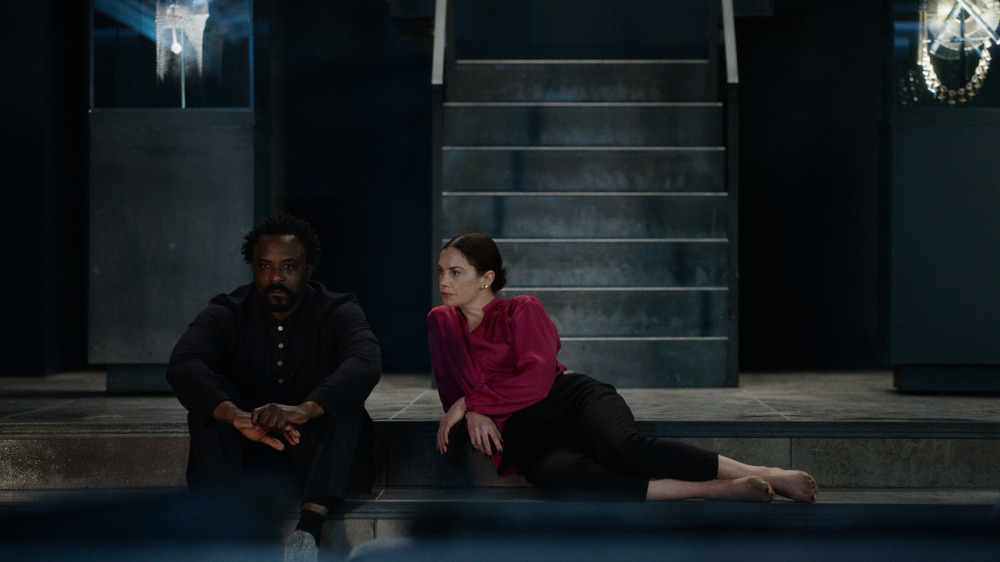What Caused Ariyon Bakare To Geek Out On The Set Of His Dark Materials - Exclusive
Life, Carnival Row, Good Omens, Rogue One: A Star Wars Story, Doctor Who, Jupiter Ascending — all of these projects have a few things in common. For one, they all feature British actor Ariyon Bakare, who you might recognize as the two-faced villain Lord Carlo Boreal from HBO's His Dark Materials. Secondly, they share a glaring common thread — all of them heavily lean into the realms of science-fiction and fantasy. Not only that, but they're all projects Bakare taken on during the past five years.
Bakare even once circled a potential role in Lovecraft Country, leading one to believe that the man has a severe attraction to genre fiction. Does he gravitate towards projects of the fantastical variety for a reason, or is it just a mere coincidence? We got the chance to ask that very question when Bakare sate down for an exclusive interview with Looper.
"I think it happened by accident," he says. "I seem to get cast in that sort of stuff a lot. I've done a lot of natural things, but the things that blow up seem to always be sci-fi or magic. But when I was younger, that's all I was into. I was into fantasy. I geeked out on fantasy. Sci-fi and fantasy was my thing. So maybe that's where I've learned all my acting styles. But yeah, I like it. You get to play these big, massive characters. But that doesn't mean I don't want to do other stuff."
His Dark Materials certainly fits in with Bakare's penchant for big fantasy worlds. As fans already know, the show (like the Philip Pullman book trilogy upon which it's based) boasts an intricate plot with a gamut of multifaceted characters, and it tackles many heavy ideas about magic, witches, angels, parallel worlds, and the complicated relationship between science and religion.
The science-fiction and fantasy genres allow us to ask big existential questions
The main conflict in His Dark Materials comes down to the battle between the governing Magisterium and the rebellious aristocrat Lord Asriel — essentially, it's a conflict between religion and science. The Magisterium seeks to shield the world from the truths that science exposes, and Asriel's rogue experiments threaten their grasp over the world. During our interview, we asked Bakare whose side he ultimately stands on — the men of faith or the men of science?
"Now you're asking some questions today, ain't you?" Bakare says with a grin as he bursts into laughter. "Look, I did a film called Life. And in Life, I remember I was working with a scientist and I did a lot of research on scientists. We had a big conversation about science versus theology. And at the end of the day, even as a scientist, you would always ask — where did it begin? So, I would always have to go back to, it has to be a spiritual thing. I believe in the universe. I believe that the universe creates us, and creates the world, and creates what we do. I believe there's an energy. So, as to your question, I would say I think I'm more theolo-sciencey."
Surely, working on a show with such extraordinary ideas must spark some interesting on-set conversations amongst the cast and crew. Does Bakare ever geek out with his fellow castmates? "There was a geek-out moment between me and Clarke Peters, he played The Master in the first season," says Bakare when asked if deep philosophical questions ever erupt on set. "We used to travel back and forth together and we'd really geek out on it a lot. And we'd have big kind of existential questions that we'd always want to ask. But after a while, when you work on it every single day, you're worried more about getting your lines in and trying to make sure you hit your character."
A fear of religious authority is a theme that's not uncommon in pop culture. In recent years, Hulu's The Handmaid's Tale has depicted a dystopian society ruled by a theonomic government, while HBO's Raised by Wolves explores a future Earth ravaged by war due to the opposing beliefs between a radical religious order known as the Mithraic and a militant atheist resistance. These themes aren't a far cry away from those explored in His Dark Materials. "I think right now we're asking these questions, aren't we?" says Bakare. "We're asking, 'Why?' We're asking, 'What's going on?' We're in the middle of a pandemic, as nature's attack on humans. So, we're asking questions. Why? Why are we here? What have we done wrong? Is it just science that's caused this? Or is it nature that's caused it? Or is it our disbelief in our own selves?"
He goes on to observe, "I think we are longing for that, for those questions to be explored in whichever way. And sci-fi and fantasy allows us to do this, allows us to throw these questions out. Allows us to have these big ideas and see where they land. I think we all have a little bit inside of ourselves. That we're always questioning how we exist in a planet that's continuously evolving, and it has a beginning, middle, and end, but yet it keeps on going. So, I think we always asked those questions."
Catch all-new episodes of His Dark Materials on Mondays at 9 PM on HBO.

